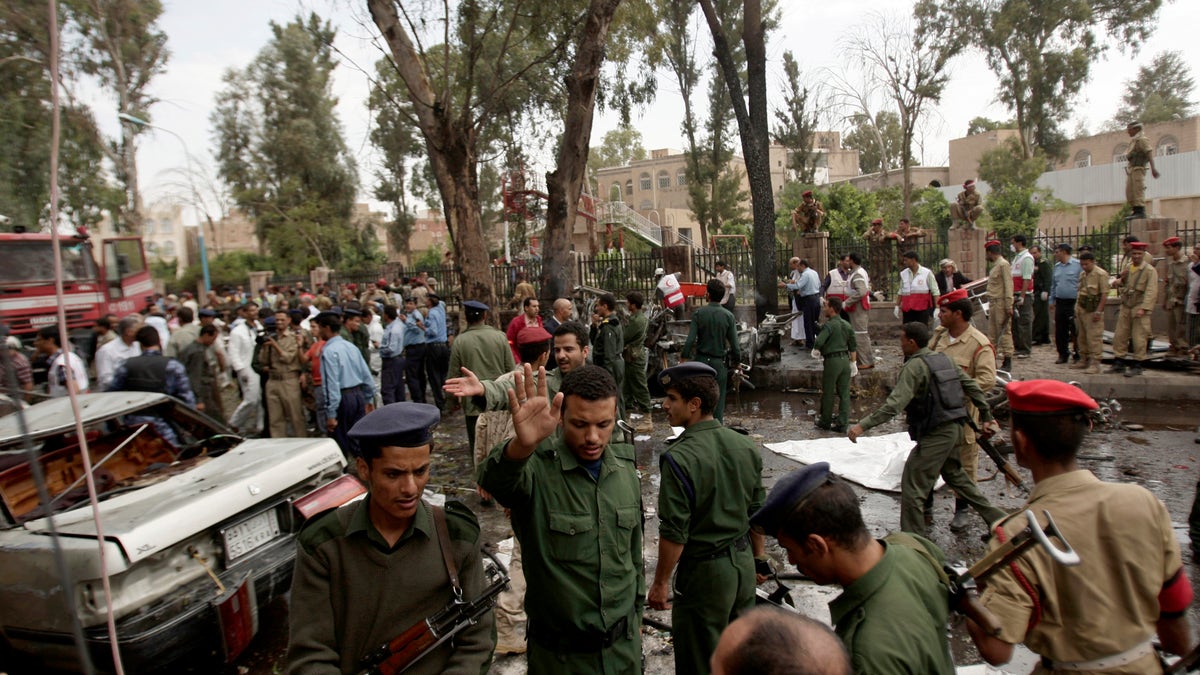
Yemeni officials and police gather at the site of a car bomb attack targeting the motorcade of the country's defense minister in Sanaa, Yemen, Tuesday, Sept. 11, 2012. Yemeni officials say a car bomb targeting the motorcade of the country's defense minister has killed several people, but the minister escaped unharmed. (AP Photo/Hani Mohammed)
A powerful car bomb struck the Yemeni defense minister's motorcade as he was driving through the nation's capital Tuesday, killing at least 13 people but leaving the minister unharmed, security officials said.
There was no immediate claim of responsibility for the blast but Al Qaeda's Yemeni branch has carried out several failed assassination attempts against the minister, Maj. Gen. Mohammed Nasser Ahmed, in the past. The attack comes a day after Yemeni authorities announced the death of the No. 2 leader of the network's Yemeni branch in an apparent U.S. airstrike.
Tuesday's bombing hit the last vehicle in the minister's three-car convoy as it was traveling through Sanaa's al-Izaa neighborhood, Yemeni security officials said. The blast left the car a charred hulk of twisted metal with burnt bodies strapped inside, and blew out the windows of storefronts and scorched a building nearby. Pools of blood stained the pavement.
Eight of the minister's security guards and five civilian bystanders were killed, the officials said on condition of anonymity because they were not authorized to brief the media.
"This is awful," said Mohamed El-Mehdi, who works in the area. "The people and children are unable to grasp what happened."
He said some of the five civilians killed were the owners of nearby shops.
While there was no claim of responsibility for the assassination attempt, Al Qaeda in the Arabian Peninsula, the terror network's Yemeni branch, has been locked in a fierce battle with the country's military, and has tried on several recent occasions to kill the defense minister.
In May, the group carried out a suicide bombing that killed 96 soldiers and wounded at least 200 in a military parade in the capital. Al Qaeda said it had been targeting Ahmed, who was not hurt in the attack.
Last September, a suicide attacker driving an explosives-laden car blew himself up in the southern city of Aden next to the minister's passing convoy. Ahmed escaped that attack unscathed as well. There was no claim of responsibility, but Yemen's military had been battling Al Qaeda militants there at the time.
A month earlier, the minister's convoy also came under attack in the southern province of Abyan, which was an Al Qaeda stronghold at the time.
Al Qaeda's Yemeni branch is seen as the world's most active, planning and carrying out attacks against targets in Yemen as well as in the U.S. The group took advantage of the political vacuum during unrest inspired by the Arab Spring last year against the country's longtime authoritarian president.
As government forces were focused on suppressing protests in the capital and elsewhere, Al Qaeda seized control of large swaths of land in southern Yemen. The group governed several major cities in the south for months until a U.S.-backed Yemeni military offensive led by the new president was able to push the militants into hiding.
In another blow to the group, the death of Al Qaeda in Yemen's No. 2 leader is seen as a major breakthrough for U.S. efforts to cripple Al Qaeda in Yemen. The impoverished nation on the southern tip of the Arabian Peninsula is on the doorstep of Saudi Arabia and fellow oil-producing nations of the Gulf and lies on strategic sea routes leading to the Suez Canal.








































